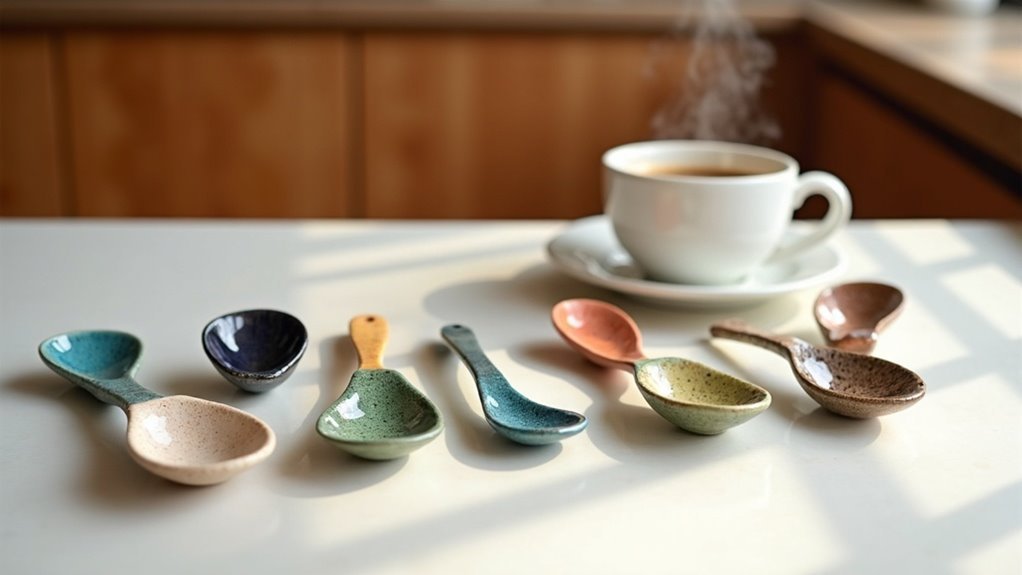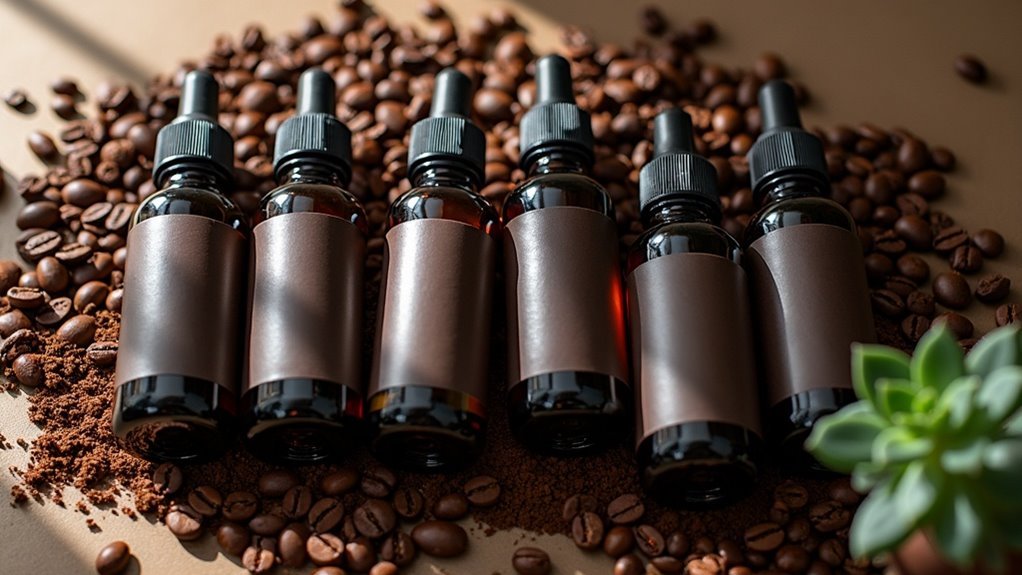Yes, coffee can affect zinc absorption. Its polyphenols and tannins bind to zinc, reducing its bioavailability. Additionally, caffeine increases urinary excretion of zinc, which can lower your levels of this essential mineral. To optimize zinc absorption, it’s best to enjoy coffee separately from zinc-rich meals or supplements, waiting at least an hour after drinking coffee before taking zinc. For a deeper understanding of how coffee interacts with other nutrients, keep exploring the fascinating world of coffee!
Key Takeaways
- Coffee contains polyphenols and tannins that can bind to zinc, reducing its bioavailability during absorption.
- The diuretic effect of caffeine in coffee increases urinary zinc excretion, potentially lowering tissue zinc levels.
- For optimal absorption of zinc, it is advisable to wait at least one hour after consuming coffee before taking zinc supplements.
- Drinking coffee close to meals can inhibit zinc absorption due to the presence of inhibitory compounds found in coffee.
- Monitoring your overall caffeine intake, especially from coffee, is important, as high consumption may negatively impact zinc levels in the body.
Understanding Zinc Absorption
Zinc absorption is a vital process for maintaining overall health, but certain dietary factors, including coffee consumption, can hinder it.
Coffee contains compounds like polyphenols and tannins that bind to zinc, reducing its bioavailability. Furthermore, caffeine has a diuretic effect that can increase urinary excretion of zinc, potentially leading to lower levels in the body.
Coffee’s polyphenols and tannins can hinder zinc absorption, while caffeine may increase zinc excretion, impacting body levels.
Some studies even suggest that high caffeine intake may correlate with decreased tissue levels of zinc, particularly in heart tissues.
To optimize zinc absorption, it’s advisable to enjoy your coffee separately from zinc-rich meals or supplements—aim for at least an hour in between—to minimize its inhibitory effects on nutrient absorption.
The Role of Coffee in Nutrient Absorption
When you enjoy your coffee, it’s important to be aware that its caffeine and polyphenols can affect the absorption of zinc in your body.
This interaction can limit the availability of zinc, particularly if you consume coffee shortly before or after meals rich in zinc or zinc supplements.
To ensure optimal zinc uptake, it’s advisable to wait at least an hour after having your coffee before consuming zinc-rich foods or supplements.
Caffeine and Zinc Interaction
Although coffee is a beloved beverage for many, it’s important to be aware of its interaction with zinc absorption. Caffeine can lead to increased urinary excretion of zinc, potentially causing lower tissue levels of this essential mineral over time.
While studies suggest that caffeine infusion doesn’t greatly affect intestinal zinc absorption, it can still decrease zinc levels in the heart. Additionally, coffee’s diuretic effects may contribute to nutrient loss, particularly in those who consume high amounts of caffeine.
To optimize zinc absorption, consider enjoying your coffee away from zinc-rich meals or supplements by at least one hour to minimize these interactions.
Timing of Intake Matters
To optimize your coffee experience, it’s important to consider how timing can affect nutrient absorption, particularly with zinc.
Consuming coffee close to meal times can inhibit zinc absorption due to the presence of polyphenols and tannins in coffee. To enhance zinc absorption, it’s recommended to wait at least one hour after drinking coffee before taking zinc supplements.
Additionally, the diuretic effect of caffeine may increase urinary excretion of zinc, which can impact your body’s overall zinc levels. While caffeine doesn’t significantly affect intestinal absorption, it can lower tissue zinc levels, especially in the heart.
To counteract any potential negative effects of coffee on zinc absorption, maintaining a balanced diet rich in zinc is essential. Timing your coffee intake can play a crucial role in maximizing both your enjoyment of coffee and your nutrient absorption.
Nutrient Absorption Implications
Understanding how coffee affects nutrient absorption is essential for optimizing your diet.
Coffee contains polyphenols and tannins that can inhibit zinc absorption by binding to zinc, reducing its bioavailability. While caffeine doesn’t notably impact intestinal zinc absorption, it may lower zinc levels in specific tissues.
Additionally, caffeine’s diuretic effect can increase urinary zinc excretion, potentially leading to lower zinc levels when consumed excessively. To enhance zinc absorption, consider taking supplements at least one hour after your coffee.
A balanced diet rich in zinc sources—like meat, shellfish, legumes, seeds, and nuts—can help counteract coffee’s effects on nutrient absorption. Enjoy your coffee, but be mindful of its potential impact on nutrients in your diet!
How Coffee Affects Zinc Levels
When you savor your morning coffee, it’s important to consider how it may influence your zinc levels. Coffee contains polyphenols and tannins that can bind to zinc, potentially hindering its absorption.
Furthermore, high caffeine intake may increase urinary excretion of zinc, leading to lower overall levels. Although caffeine doesn’t significantly affect intestinal zinc absorption, it can reduce zinc levels in heart tissue.
To enhance zinc absorption, it’s advisable to wait at least one hour after enjoying your coffee before taking zinc supplements.
Prolonged excessive coffee consumption has been associated with lower serum zinc levels, which can impact your health.
Other Nutrients Impacted by Coffee
Coffee doesn’t just affect zinc absorption; it also poses challenges for calcium and iron uptake.
High caffeine levels in coffee can hinder your body’s ability to absorb these essential minerals, potentially leading to deficiencies.
Understanding these impacts can help you make more informed choices about your coffee consumption and its effects on your overall nutrient intake.
Calcium Absorption Issues
While you may savor your daily cup of coffee, it’s important to be aware that it can impact the absorption of key nutrients, particularly calcium.
- Each cup of coffee might contribute to a loss of approximately 4 mg of calcium.
- The diuretic effect of caffeine can elevate urinary calcium excretion, which may be detrimental to bone health.
- High consumption of caffeine is also associated with lower levels of vitamin D, which is crucial for calcium absorption.
To optimize calcium absorption, it’s advisable to take supplements at least one hour after enjoying your coffee.
If you frequently indulge in coffee, ensuring you consume adequate dietary calcium is key to supporting bone health and avoiding potential deficiencies.
Iron Uptake Reduction
While savoring your favorite cup of coffee, you may be surprised to learn that it can significantly impact your body’s ability to absorb non-heme iron.
Studies indicate that consuming coffee alongside meals can reduce iron absorption by as much as 40–90%. The presence of tannins and polyphenols in coffee binds to iron, making it more challenging for your body to utilize this vital nutrient, which is particularly important if you depend on plant-based sources for your iron intake.
To maximize iron absorption, it’s advisable to wait at least one hour after enjoying your coffee before consuming iron-rich meals or taking supplements. Timing plays a crucial role in maintaining healthy iron levels and preventing deficiencies, ensuring that your coffee experience remains enjoyable without compromising your nutritional needs.
Best Practices for Zinc Supplementation
To maximize the benefits of zinc supplementation while considering your coffee consumption, it’s essential to think about the timing of your intake. Here are some best practices:
- If you enjoy coffee, take zinc supplements at least one hour after your coffee to enhance absorption.
- Consider incorporating a balanced diet rich in zinc sources such as meat, shellfish, legumes, and seeds to complement your supplementation.
- Be mindful of your overall caffeine consumption, as excessive intake may lead to increased urinary excretion of zinc.
Enjoy your coffee while optimizing your zinc intake!
Timing Your Coffee Consumption
Understanding the timing of your coffee consumption is essential for optimizing your overall nutrient absorption, particularly when it comes to zinc.
Consuming coffee close to meals can hinder zinc absorption due to polyphenols and tannins found in coffee that bind to zinc. To enhance zinc absorption, it’s advisable to wait at least one hour after drinking coffee before taking zinc supplements.
While caffeine doesn’t directly affect intestinal zinc absorption, it may lower zinc tissue levels, highlighting the importance of timing your coffee intake. Additionally, high caffeine consumption can increase urinary excretion of zinc.
To mitigate these effects, consider spacing your coffee intake away from meals or zinc-containing supplements for better nutrient management. Enjoy your coffee, but be mindful of when you enjoy it in relation to your nutrient intake!
Maintaining a Balanced Diet for Nutrient Health
Maintaining a balanced diet is essential for ensuring ideal nutrient health, especially when it comes to minerals like zinc.
If you enjoy coffee, it’s important to consider how it interacts with zinc absorption and overall nutrient health. Here are some tips to support optimal zinc levels while enjoying your coffee:
- Include a variety of zinc-rich foods like nuts, seeds, and legumes in your diet to complement your coffee consumption.
- Be mindful of your caffeine intake, as it can have diuretic effects that may impact zinc levels.
- To maximize zinc absorption, space out your coffee consumption from zinc-rich meals or supplements by at least one hour.








